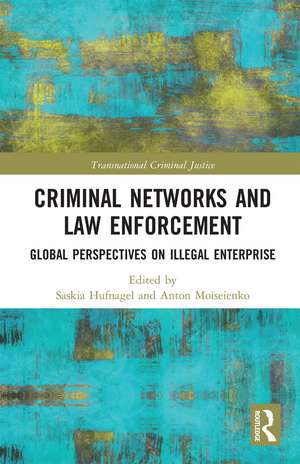Criminal Networks and Law Enforcement: Global Perspectives On Illegal Enterprise: Transnational Criminal Justice
Editat de Saskia Hufnagel, Anton Moiseienkoen Limba Engleză Paperback – 31 mar 2021
| Toate formatele și edițiile | Preț | Express |
|---|---|---|
| Paperback (1) | 385.36 lei 6-8 săpt. | |
| Taylor & Francis – 31 mar 2021 | 385.36 lei 6-8 săpt. | |
| Hardback (1) | 765.84 lei 6-8 săpt. | |
| Taylor & Francis – 17 iul 2019 | 765.84 lei 6-8 săpt. |
Preț: 385.36 lei
Nou
Puncte Express: 578
Preț estimativ în valută:
73.75€ • 76.71$ • 60.88£
73.75€ • 76.71$ • 60.88£
Carte tipărită la comandă
Livrare economică 14-28 aprilie
Preluare comenzi: 021 569.72.76
Specificații
ISBN-13: 9780367726973
ISBN-10: 0367726971
Pagini: 252
Dimensiuni: 156 x 234 x 13 mm
Greutate: 0.36 kg
Ediția:1
Editura: Taylor & Francis
Colecția Routledge
Seria Transnational Criminal Justice
Locul publicării:Oxford, United Kingdom
ISBN-10: 0367726971
Pagini: 252
Dimensiuni: 156 x 234 x 13 mm
Greutate: 0.36 kg
Ediția:1
Editura: Taylor & Francis
Colecția Routledge
Seria Transnational Criminal Justice
Locul publicării:Oxford, United Kingdom
Public țintă
PostgraduateCuprins
- ‘Introduction’;
Part 1: Formation of Criminal Networks; - ‘Co-offending in Norway: A comparative perspective’;
- ‘Sticking together: Evidence of co-offending partnerships in two-mode covert networks’;
Part 2: Management of Criminal Networks; - ‘"It’s just business:" Leaders’ strategies for risk management in criminal networks’;
- ‘Cybercrime, money mules and situational crime prevention: Recruitment, motives and involvement mechanisms’;
Part 3: Illicit Trafficking Networks; - ‘To get a good price, "you have to sell in international bidding sites": Trafficking of metal-detected cultural goods from South Asia’;
- ‘Using routine activity theory to explain illegal fishing in the Indo-Pacific’;
Part 4: Criminal Networks and Politics; - ‘Meet the in-betweeners: Exploring the quality and strength of ties in the "Mafia Capitale" network in Rome’;
- ‘Power and trust networks in the organisation of crime in Ukraine’;
- ‘The social organisation of treason: Anti-Nazi networks in the Third Reich’;
Part 5: Advancing the Field; - ‘Organised crime research 1985-2014: Mapping three decades of research dynamics through social network analysis’;
- ‘Conclusions’;
Notă biografică
Dr Saskia Hufnagel is a Senior Lecturer in Criminal Law at Queen Mary University of London. She previously worked as a Research Fellow at the Australian Research Council Centre of Excellence in Policing and Security (CEPS), Griffith University, Australia, and was a Leverhulme Fellow at the University of Leeds. She taught at the ANU College of Law, Canberra, and held a permanent teaching position at the University of Canberra. Her main research areas encompass law enforcement cooperation in Asia, North America, the EU and Australasia, comparative constitutional and human rights law with a focus on terrorism legislation and the policing of art crime. She has widely published on national and international police cooperation, security, comparative constitutional law and art crime. Dr Hufnagel is a qualified German legal professional and accredited specialist in criminal law.
Dr Anton Moiseienko is a Research Fellow at the Centre for Financial Crime & Security Studies of the Royal United Services Institute, London. He holds a PhD in law from Queen Mary University of London. He has published on international law and criminal law, including in the International & Comparative Law Quarterly and Criminal Law Review.
Descriere
This collection analyses illicit networks and discusses the practical implications for law enforcement and crime prevention. The authors draw on various methodologies and apply them to a variety of international criminological settings.










